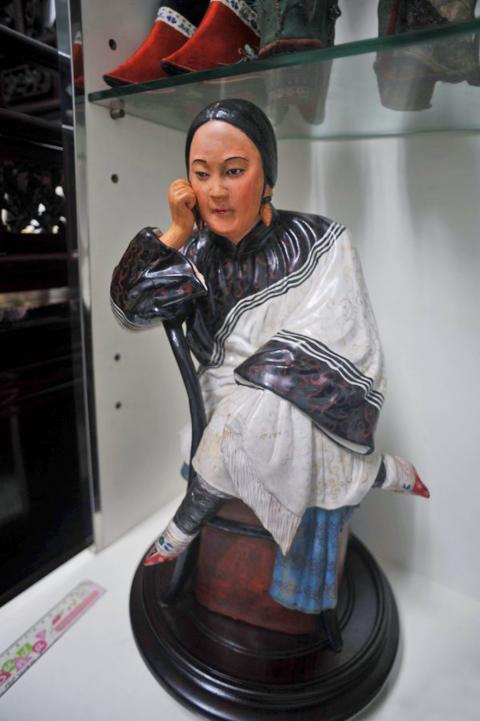A New Taipei City doctor, who is recognized as an authority on the traditional Chinese practice of foot binding, has a collection of more than 10,000 pairs of lotus shoes.
David Ko (柯基生), who works at Broad River Hospital in New Taipei City’s Tucheng District (土城), has been called a collector, an archeologist, an anthropologist and a sexologist.
Ko was first interested in the study of foot binding when he was 10 years old, which led to his study of medicine.

Photo: Huang Shao-kuo, Taipei Times
Ko said he is curious about what has been a taboo subject, adding that about 3 billion people had their feet bound before the practice ended in the 20th century.
Ko has traveled throughout Taiwan and China photographing and interviewing more than 300 elderly women who had their feet bound.
Ko’s collection is thought to be the largest and most comprehensive and has attracted the attention of the Smithsonian Institution National Museum of Natural History, which has borrowed the collection and invited Ko to speak.
Ko has about 5,000 “golden lotus” slippers, which are 3 Chinese inches long (about 10cm), and was once considered the ideal foot length.
He has also collected more than 1,000 photographs of women and girls with bound feet.
Ko said he bought his first pair of lotus shoes for NT$640 at an antiques shop when he was 18.
Foot binding represents the widest-scale example of a cultural practice that involves modifying the female form in the pursuit of “aesthetic perfection,” Ko said, adding that the practice was widespread in China during the Northern Song Dynasty and continued for about 1,000 years.
Young girls who chose to have their feet bound did so not for male pleasure, but rather as a form of self restraint, Ko said, adding that the practice formed part of a system of ethics and self-cultivation.
Ko said some males also underwent the practice, adding that historians have connected the practice with male prostitution and to a social practice among some families to raise boys as girls.
Ko said he was surprised to discover that many of the shoes in his collection had belonged to males.
The practice was mostly popular among wealthy Han families, but spread to Manchurians during the Qing Dynasty, Ko said, adding that the expression “small feet are for ladies, large feet are for slaves” became popular in Qing society.
The Qing court officially forbade the practice among Manchurians, but were powerless to stop it, Ko said.
The practice continued in Taiwan even after it was seen as shameful in China, Ko said.
The Japanese colonial administration and civic organizations in the 1920s ended the practice in Taiwan, he said.
Many shoes in Ko’s collection were damaged by environmental conditions and rodents.
Ko said he began sealing the shoes in air-tight bags 10 years ago, adding that he controls the lighting, humidity and temperature in his storage room to preserve the collection.

Taipei has once again made it to the top 100 in Oxford Economics’ Global Cities Index 2025 report, moving up five places from last year to 60. The annual index, which was published last month, evaluated 1,000 of the most populated metropolises based on five indices — economics, human capital, quality of life, environment and governance. New York maintained its top spot this year, placing first in the economics index thanks to the strength of its vibrant financial industry and economic stability. Taipei ranked 263rd in economics, 44th in human capital, 15th in quality of life, 284th for environment and 75th in governance,

The Sports Administration yesterday demanded an apology from the national table tennis association for barring 17-year-old Yeh Yi-tian (葉伊恬) from competing in the upcoming World Table Tennis (WTT) United States Smash tournament in Las Vegas this July. The sports agency said in a statement that the Chinese Taipei Table Tennis Association (CTTTA) must explain to the public why it withdrew Yeh from the WTT tournament in Las Vegas. The sports agency said it contacted the association to express its disapproval of the decision-making process after receiving a complaint from Yeh’s coach, Chuang

Control Yuan Secretary-General Lee Chun-yi (李俊俋) tendered his resignation last night, admitting that he had misused a government vehicle, as reported by media. His resignation was immediately accepted by the Control Yuan. In a statement explaining why he had resigned, Lee apologized for using a Control Yuan vehicle to transport his dog to a pet grooming salon on May 20. The issue first came to light late last month, when TVBS News reported that Lee had instructed his driver to take the dog to the salon. The news channel broadcast photos that it said were taken by an unnamed whistle-blower, which purportedly showed the

A former officer in China’s People’s Liberation Army (PLA) who witnessed the aftermath of the 1989 Tiananmen Square massacre has warned that Taiwan could face a similar fate if China attempts to unify the country by force. Li Xiaoming (李曉明), who was deployed to Beijing as a junior officer during the crackdown, said Taiwanese people should study the massacre carefully, because it offers a glimpse of what Beijing is willing to do to suppress dissent. “What happened in Tiananmen Square could happen in Taiwan too,” Li told CNA in a May 22 interview, ahead of the massacre’s 36th anniversary. “If Taiwanese students or